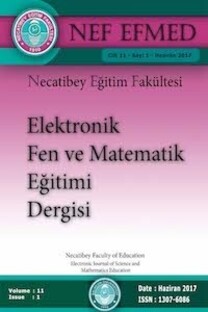Ağ araştırması (web quest) tasarlayıcılarının bu etkinliklerin hazırlanması sürecine ve Türkiye'de uygulanabilirliklerine ilişkin görüşleri
Nitel tasarımda gerçekleştirilen bu örnek olay araştırmasında Ağ Araştırması etkinliği hakkında bilgi sahibi ya da en az bir Ağ Araştırması etkinliği hazırlayan eğitimcilerin Ağ Araştırması etkinliklerinin hazırlanması sürecine ve Türkiye’de uygulanabilirliklerine ilişkin düşüncelerinin belirlenmesi amaçlanmıştır. Araştırmanın örneklemini bir Üniversitenin Fen Bilimleri Enstitüsü Kimya Eğitimi Yüksek Lisans Programı kapsamındaki Kimya Eğitiminde İnternet Tabanlı Öğretim dersini alan 12 öğrenci oluşturmaktadır. Araştırmada yapılandırılmış Ağ Araştırması Görüş Formu ile toplanan nitel veriler analitik tümevarım yöntemiyle analiz edilmiştir. Katılımcılar bu tür etkinliklerin öğrenme ortamlarına hem duyuşsal hem de bilişsel açıdan olumlu katkı getireceğini belirtmişler; ancak okulların mevcut yapısı dikkate alındığında bazı teknik donanım ve öğrenci/öğretmen yeterlilikleri konusunda yaşanabilecek bazı olumsuzluklara dikkat çekmişlerdir.
Webquest designers' thoughts about the preparation process and applicability of these activities in Turkey
In this qualitative case study it was aimed to sort out the views of the educators, who knows about webquest activities or designed at least one webquest, about preparation process and applicability of these activities considering Turkey’s educational conditions. The sample of the study consisted of 12 graduate students who attended the Internet Based Learning in Chemistry Education course in Chemistry Education Program at Institute of Science at a University. The qualitative data collected using a structured Views about Webquest Form (VWF) were analyzed with the analytic induction method. The participants drew attention to the points that this type of activities would make positive contributions to the learning situations in both affective and cognitive means; however, taking the existing conditions of the schools into account, they pointed some shortcomings related to technology and student/teacher proficiencies.
___
- Allen, R. B., Murray, G. C., & Yang, H. (2002). WQ: An environment for teaching information access skills. Proceedings of World Conference on Educational Multimedia, Hypermedia and Telecommunications (pp. 34-39). Chesapeake, VA.
- Becker, H. J. (2000). Findings from teaching, learning, and computing survey: Is Larry Cuban right? (p. 10). _____http://www.crito.uci.edu/tlc/findings/ccsso.pdf> (S.E.T.: 15.04.2007).
- Bryman, A., & Burgess, R.G. (Eds.). (1994). Analyzing qualitative data. London: Routledge.
- Dodge, B. (1995a). Some thoughts about WebQuests. _____http://webquest.sdsu.edu/about_webquests.html>. (S.E.T.: 15.04.2007).
- Dodge, B. (1995b). WebQuests: a technique for Internet-based learning. Distance Educator, 1 (2), 10-13.
- Dodge, B. (1998). Building blocks of a WebQuest. _____http://projects.edtech.sandi.net/staffdev/buildingblocks/p-index.htm> (S.E.T.: 22.04.2007).
- Dodge, B. (2001). FOCUS: Five rules for writing a great WebQuest. Learning & Leading with Technology, 28 (8), 6-9.
- Dodge (2002). WebQuest Taskonomy: A taxonomy of webquest tasks. _____http://webquest.sdsu.edu/taskonomy.html> (S.E.T.: 21.07.2008).
- Fazio, R. P., & Karanen, K. (1995). Mapping a course with GIS. Science Teacher, 62, 16-19.
- Gaskill, M., McNulty, A. & Brooks, D. W. (2006). Learning from WebQuests. Journal of Science Education and Technology, 15 (2), 133-136.
- Gülmahar, Y., Kalelioğlu, F., & Madran, R. O. (2008). Using dynamic Webquest approach in teacher education to promote project-based learning. _____http://ietc2008.home.anadolu.edu.tr/ietc2008/228.doc> (S.E.T.: 09.06.2009).
- Halat, E. (2008). Webquest-temelli matematik öğretiminin Sınıf öğretmeni adaylarının geometrik düşünme düzeylerine etkisi. Selçuk Üniversitesi Ahmet Keleşoğlu Eğitim Fakültesi Dergisi, 25, 115-130.
- Kanuka, H., Rourke, L., & Laflamme, E. (2007). The influence of instructional methods on the quality of online discussion. British Journal of Educational Technology, 38, 260-271.
- King, K. P. (2003). The webquest as a means of enhancing computer efficacy. (ERIC No. ED474439)
- Kosakowski, J. (1998). The benefits of information technology. (ERIC No. ED420302)
- Leahy, M., & Twomey, D. (2005). Using Web Design with Pre-Service Teachers as a Means of Creating a Collaborative Learning Environment. Educational Media International, 42 (2),143-151.
- Li, Q. (2005). Technology, mathematics, and science: What do teachers and students think? Proceedings of the IASTED International Conference on Education and Technology, 2005 (1) 213-215.
- LoParino, C. A. (2005). A transformational process: facilitating webquests. (ERIC No. ED490748)
- March, T. (2005). What WebQuests are (really!). _____http://bestwebquests.com/what_webquests_are.asp> (S.E.T.: 10.04.2007).
- McGlinn, J. E., & McGlinn, J. M. (2003). Motivating learning in a humanities class through innovative research assignments: a case study. (ERIC No. ED479392)
- McKenzie, J. (1999). Scaffolding for success. From Now On: The Educational Technology Journal, 9 (4). _____http://fno.org/dec99/scaffold.html> (S.E.T.: 04.03.2009).
- Şen, A., & Neufeld, S. (2006). In Pursuit of Alternatives in ELT Methodology: Webquests. The Turkish Online Journal of Educational Technology, 5, Article 7.
- Wagman, J. C. (2005). The effects of an inquiry-internet research project on motivation, self-efficacy, and academic autonomy in heterogeneously grouped high school Latin I students. (ERIC No. ED490051)
- ISSN: 1307-6086
- Yayın Aralığı: Yılda 2 Sayı
- Başlangıç: 2007
- Yayıncı: Balıkesir Üniv. Necatibey Eğitim Fak.
Sayıdaki Diğer Makaleler
4MAT Öğretim Modelinin Öğrencilerin Erişileri ve Öğrenme Stillerine Etkisi
Sevinç M. UYANGÖR, F. Tuğba DİKKARTIN
Sibel Er NAS, Hakan Şevki AYVACI
TIMSS Anketinin Matematik Dersleriyle İlgili Sorularında Öğrencilerin Tutarsız Cevapları
Hüseyin H. YILDIRIM, SELDA YILDIRIM
Finlandiya'nın PISA' daki başarısının nedenleri: Türkiye için alınacak dersler
İlköğretim Öğrencilerinin Çevre Sorunu İle İlişkili Temel Kavramları Gerçekleştirme Düzeyleri
